 Petzlover
Petzlover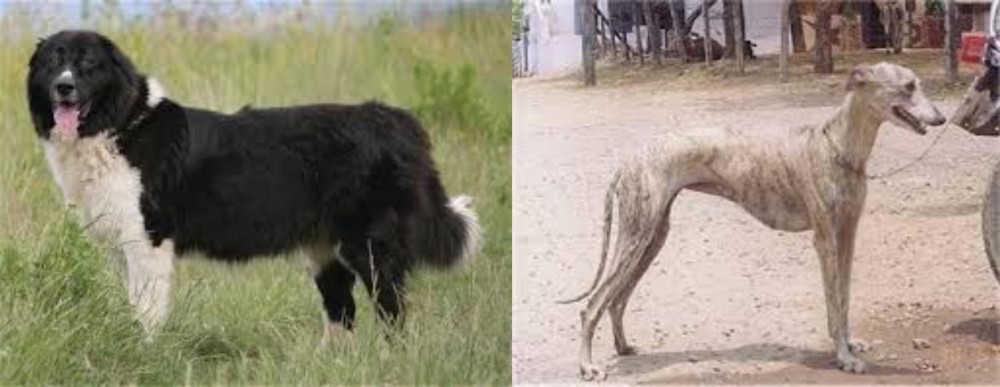 Bulgarian Shepherd is originated from Bulgaria but Rampur Greyhound is originated from India. Both Bulgarian Shepherd and Rampur Greyhound are of same height. Bulgarian Shepherd may weigh 27 kg / 60 pounds more than Rampur Greyhound. Bulgarian Shepherd may live 43 years more than Rampur Greyhound. Both Bulgarian Shepherd and Rampur Greyhound has almost same litter size. Bulgarian Shepherd requires Moderate Maintenance. But Rampur Greyhound requires Low Maintenance
Bulgarian Shepherd is originated from Bulgaria but Rampur Greyhound is originated from India. Both Bulgarian Shepherd and Rampur Greyhound are of same height. Bulgarian Shepherd may weigh 27 kg / 60 pounds more than Rampur Greyhound. Bulgarian Shepherd may live 43 years more than Rampur Greyhound. Both Bulgarian Shepherd and Rampur Greyhound has almost same litter size. Bulgarian Shepherd requires Moderate Maintenance. But Rampur Greyhound requires Low Maintenance
 The Bulgarian Shepard Dog comes from the ancient line of Molossers of Central Asia and Tibet, and the shepherds of the Balkans, Turkey and Caucasus. Among the oldest and most valued of the working dogs of Europe, the Bulgarian Shepherd breed was created by mixing the Balkan breeds with the dogs from Central Asia by the proto-Bulgarians around the 7th century. The Karakachanskoto Kuche was introduced to Bulgaria and accepted by the sheep herders. Mixing this breed in with the Balkan and Central Asian mix developed the Bulgarian Shepherd we know today. In the long run the original Karakachanskoto Kuche became extinct, replaced entirely by the Bulgarian Shepherd even in places where the new breed is still called by the Kuche name. Although the breeds are not the same, most of the dog world does not know the difference.
The Bulgarian Shepard Dog comes from the ancient line of Molossers of Central Asia and Tibet, and the shepherds of the Balkans, Turkey and Caucasus. Among the oldest and most valued of the working dogs of Europe, the Bulgarian Shepherd breed was created by mixing the Balkan breeds with the dogs from Central Asia by the proto-Bulgarians around the 7th century. The Karakachanskoto Kuche was introduced to Bulgaria and accepted by the sheep herders. Mixing this breed in with the Balkan and Central Asian mix developed the Bulgarian Shepherd we know today. In the long run the original Karakachanskoto Kuche became extinct, replaced entirely by the Bulgarian Shepherd even in places where the new breed is still called by the Kuche name. Although the breeds are not the same, most of the dog world does not know the difference.
In Bulgaria however the Karakachan is a national treasure and the history of the breed runs deep. One Kuche could run up to 1200 animals and hundreds were used by the herdsmen in the mountains of Bulgaria. There were many regional types of Bulgarian Shepherds with very little difference between those types. These dogs were so prized by the shepherds that the dogs ate first before the people. The dogs however ate a vegetarian diet of milk, wheat, water and oats. The Bulgarian Shepherd lives a long life of often over 20 years. The Bulgarian Army made good use of these dogs early in the 20th century.
Following World War II, the wolves were close to extinction and property in Bulgaria was nationalized. There was no longer a need for a large force of working dogs. The Communist government exterminated large numbers of sheep dogs including the Bulgarian Shepherd. Only those species on government owned farms and in remote regions survived. When the government farms were disbanded in the early 20th century, these dogs were exterminated as well. Only those in the mountains survived. Commercial breeding of the Bulgarian Shepherd in the end of the century has resulted in controversy as other breeds came into the breeding program.
Use of breeds such as Sarplaninacs, Caucasian Ovcharkas, St. Bernards, Central Asian Ovcharkas and Bosnian Tornjaks in these programs resulted in Bulgarian Shepherd or Karakachans that were a lot different from the original breed. There is therefore some concern about the future of the breed in Bulgaria, yet they received official Bulgarian national recognition in 2000. Today’s Bulgarian Shepherd is a guard dog for both property and livestock.
The official standard for the breed came about in 1991 and in 2005 it was recognized by the Bulgarian State Commission for Animal Breeds. Only those dogs that meet this standard are considered “true” Karakachans. The Bulgarian Shepherds are willing to fight bears and wolves in defense of its family and flock. The dog is brave and loyal, dignified and powerful. They are recognized by both the Dog Registry of America, Inc. (DRA) and the Bulgarian Republican Federation of Cynology (BRFC) a member of the FCI.
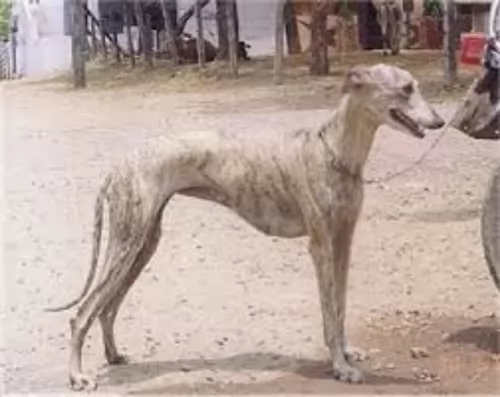 Known also as the North-Indian Greyhound or the Rampur Hound, the Rampur Greyhound is native to the Rampur area of Northern India.
Known also as the North-Indian Greyhound or the Rampur Hound, the Rampur Greyhound is native to the Rampur area of Northern India.
This dog is a member of the sighthound family, and in the past has been sought after for its efforts in controlling jackals.
The dog is also able to cover large distances at high speed. Some commemorative postage stamps were issued in 2005 as acknowledgement of this attractive dog breed.
 A massive, powerful and muscular Molosser, the Bulgarian Shepherd is strong, agile, powerful and fast. They are intelligent and reliable. They have a long, thick, harsh coat in white with patches of black. Their skull is massive and broad with a furrowed forehead. The muzzle is massive as well while the nose has wide nostrils and is fairly large. It has close fitting, thick lips with strong, scissor bite jaws. The Bulgarian Shepherd’s eyes are deep, oblique and small. They are either hazel or dark. They have an intelligent and confident, yet firm almost grim expression.
A massive, powerful and muscular Molosser, the Bulgarian Shepherd is strong, agile, powerful and fast. They are intelligent and reliable. They have a long, thick, harsh coat in white with patches of black. Their skull is massive and broad with a furrowed forehead. The muzzle is massive as well while the nose has wide nostrils and is fairly large. It has close fitting, thick lips with strong, scissor bite jaws. The Bulgarian Shepherd’s eyes are deep, oblique and small. They are either hazel or dark. They have an intelligent and confident, yet firm almost grim expression.
Their ears are low set, small and v-shaped. They sit close to the head which sits on a powerful but short neck. They have a broad back, well-muscled body with a deep chest and long, rough tail. Their gait is a trot with a spring in their step. There are two types of coats – longhaired and shorthaired with no undercoats.
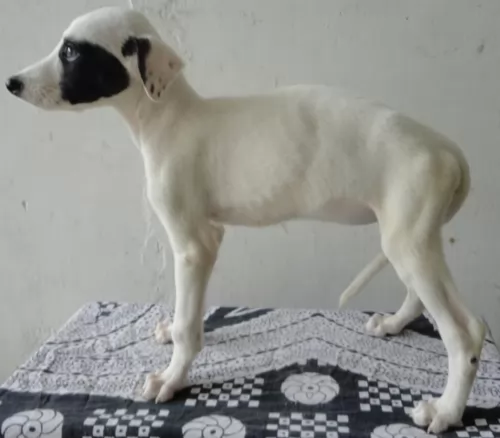 In height, the Rampur Greyhound stands at between 55 and 75 cm and they weigh in the region of 27 to 30kg.
In height, the Rampur Greyhound stands at between 55 and 75 cm and they weigh in the region of 27 to 30kg.
They are much the same as other greyhounds, but they’re somewhat wider and just a little bit more muscular. The head too, is broader than the slimmer head of the English Greyhound. Of course these dogs are known for the slim, pointed nose, the high-set ears which are sometimes half-floppy, half-erect. The eyes are large and the tail is long and slim.
The coat is short and smooth and is in colors such as gray, fawn, some white, some black with white and some brindle.
Your Rampur Greyhound is social around his human family, lapping up all their attention. He is the kind of dog that can be seen sprinting at high speed over the fields, but he is also not averse to lying peacefully with you on the sofa.
He is far better suited to a home with large gardens or on a farm as opposed to being confined to a small property in the city.
He can be gentle but when required, he becomes an excellent watchdog. He will need training and socialization as he can be rambunctious indoors, knocking things over. Training makes him obedient and restrained They get on well with children and other pets in the home.
 This is a working dog, intelligent and independent guard dog. Reserved around strangers but loyal and devoted with his family. Tolerant of children in their family if they were raised with them. Not only will she defend human family members, she will guard and defend household pets as well. He is quite capable of making her own independent decisions. These are very intense guard dogs that will respond aggressively if they think their people are being attacked.
This is a working dog, intelligent and independent guard dog. Reserved around strangers but loyal and devoted with his family. Tolerant of children in their family if they were raised with them. Not only will she defend human family members, she will guard and defend household pets as well. He is quite capable of making her own independent decisions. These are very intense guard dogs that will respond aggressively if they think their people are being attacked.
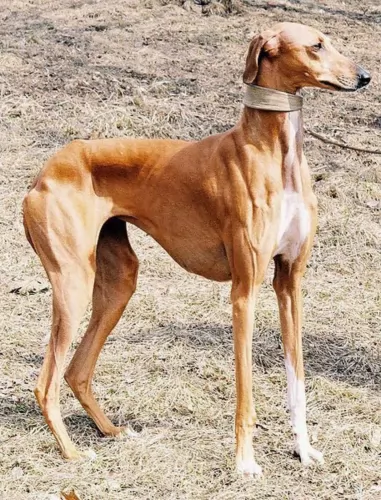 Everyone loves the Rampur Greyhound, and why not? He is fantastic with children because of his gentle, loving nature. He is a playful dog too and will require a daily dose of exercise.
Everyone loves the Rampur Greyhound, and why not? He is fantastic with children because of his gentle, loving nature. He is a playful dog too and will require a daily dose of exercise.
They aren’t noisy dogs, being naturally timid, but he still loves to get out and about with his daily walk to see and experience new sights and smells.
When you bring a Rampur Greyhound into your home, you’re bringing in a whole lot of wonderful companionship, love and loyalty from this remarkable canine.
 The breed itself is known to be healthy but they do face some of the usual health issues of the massive, giant breeds. This includes knee and elbow dislocation; hip dysplasia; bloat; entropion and osteosarcoma. All of these conditions require medical intervention, but bloat and osteosarcoma are the deadliest. Bloat needs immediate attention and osteosarcoma is a deadly bone cancer.
The breed itself is known to be healthy but they do face some of the usual health issues of the massive, giant breeds. This includes knee and elbow dislocation; hip dysplasia; bloat; entropion and osteosarcoma. All of these conditions require medical intervention, but bloat and osteosarcoma are the deadliest. Bloat needs immediate attention and osteosarcoma is a deadly bone cancer.
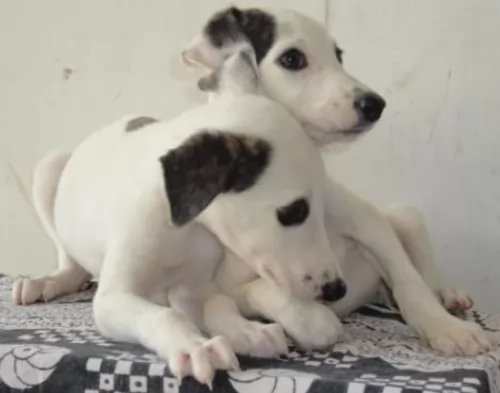 Rampur Hounds are generally a healthy dog breed, and their health is enhanced when you take good care of them and provide them with lots of love, good food and exercise.
Rampur Hounds are generally a healthy dog breed, and their health is enhanced when you take good care of them and provide them with lots of love, good food and exercise.
Still, every dog can fall prey to any one of the many dog illnesses there are such as cancer, bloat, diabetes, ear infections, epilepsy, obesity, eye problems and others.
This can be deadly for your dog. Gas collects in the stomach and the stomach can twist. You’ll notice your dog has a hard, swollen stomach and he is lethargic, but restless. Getting him to the vet as quickly as possible should be a top priority.
Your pet can develop all kinds of skin problems where he bites and scratches, causing bacteria. It can be terribly painful for your pet, and even ticks and fleas on the skin can cause cause a lot of irritation for your pet.
Some people add in omega 3 oils to their pet’s diet to help with dry skin. Don’t let your pet suffer with skin allergies and other problems that are itchy and painful. Get him to the vet so you can get to the root of what is causing him so much frustration with his skin.
 These are large dogs with large appetites, but you want to keep them lean and active. Feed them at least twice a day with a high quality large or giant dog dry food. Four to five cups of food per day is the maximum.
These are large dogs with large appetites, but you want to keep them lean and active. Feed them at least twice a day with a high quality large or giant dog dry food. Four to five cups of food per day is the maximum.
Patellar Luxation – a floating kneecap or dislocated knee. Will cause lameness.
Osteosarcoma – bone cancer must be treated immediately as it is potentially fatal.
The Bulgarian Shepherd needs a good amount of exercise every day. Remember this is a working breed and they need a job. Long walks every day are essential for his well-being.
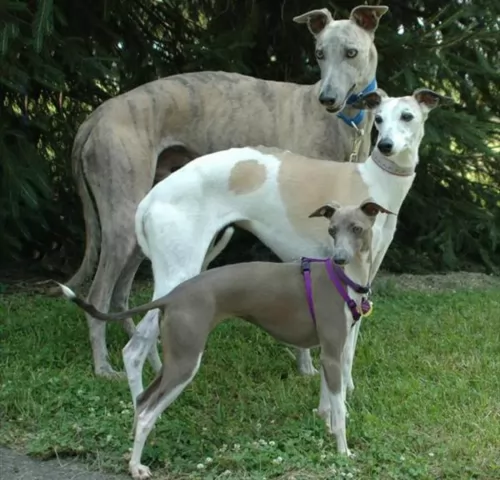 Active and playful, your Rampur Hound will need a lot of space to let off steam and run. He will look forward to his walks every day with you. Maybe you’ll need a tennis racquet to hit the ball far enough for him to sprint after.
Active and playful, your Rampur Hound will need a lot of space to let off steam and run. He will look forward to his walks every day with you. Maybe you’ll need a tennis racquet to hit the ball far enough for him to sprint after.
These dogs, with their short coats, are considered to be low maintenance, even though they do shed.
A good brush twice a week will do them good and they just love being massaged. It’s your time to run your hands over the slim, muscled body to make sure there are no unusual lumps on him.
Follow a regular grooming regime when you brush him. Check inside his ears, have a look at his eyes to make sure they’re still bright. Check inside his mouth for bad teeth which could be causing him terrible pain and make sure to trim his nails.
To be healthy and content, every dog needs good food.For convenience it can be great to feed your Greyhound one of the high quality commercially manufactured dog foods. To vary the food occasionally, add in some delicious home-made food too.
Once or twice a week you can simply add some home-made food to the dry kibble. Boiled chicken, brown rice or pasta and spinach, sweet potatoes and carrots are a healthy choice for your pet. Nothing complicated.
If you cook it in bulk, you can chop it all up and feed smaller portions to your pet. Some raw meat added in from time to time will also keep him healthy.
A simple meal like this will please your dog no end. No exotic spices and strange, weird kinds of food which could upset his stomach – just plain and simple the way dogs love it.
Ensure there is always a bowl of fresh, cool water within his reach.